The truth will set you free! But what if it won’t? What if the unvarnished truth is an impediment to a worthy goal? If a slight mistruth would inspire people to do the right thing, it might be wrong not to lie…
Or so some authors would have us believe.
The Cosmic Computer by H. Beam Piper (1963)
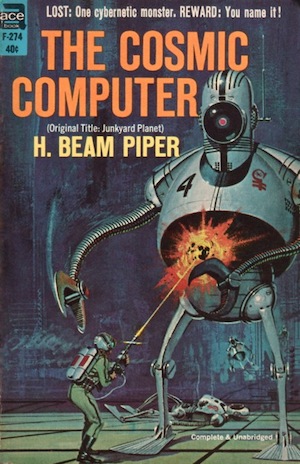
Conn Maxwell returns to backwater Poictesme in possession of a secret that will transform that underdeveloped planet. During his Terran university sojourn, Conn has uncovered one of the Federation’s1 most closely held secrets: the location of the supercomputer Merlin. Once Poictesme develops the means to reach Merlin, the nigh-godlike computer will guide Conn’s fellow cosmic bumpkins towards planetary prosperity.
All of which is a barefaced lie. Conn does not believe Merlin exists at all. However, the steps required to reach Merlin are the same steps needed to exploit the abundant military stores abandoned in Poictesme’s star system in the aftermath of a recent war. The Merlin lie is simply the means to entice Conn’s people to embrace prosperity.
I am embarrassed to admit that it took me decades to realize why Piper named his protagonist “Conn.”
The Next Continent by Issui Ogawa (2003)
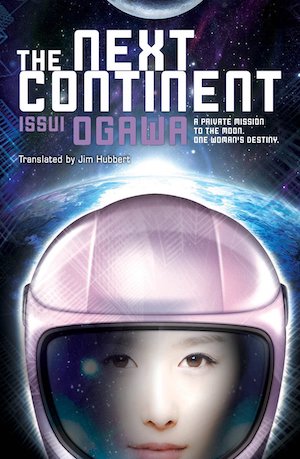
Led by Eden Leisure Entertainment, a consortium undertakes a tremendous challenge: turning the chairman’s thirteen-year-old daughter Tae’s vision of a lavish wedding chapel on the Moon into reality. Among the many recruited for the cause is skilled auditor Reika Hozumi, who is key to convincing investors that the project is a sound one.
In fact, the project cannot possibly pencil out. While Tae’s claim that people will spend vast sums on lavish weddings is entirely correct, the case that this means a wedding chapel on the Moon can turn a profit is flimsy. It’s best for Reika’s peace of mind that she has no idea Tae’s ultimate goal is not the one publicized. Gullible Reika’s primary task is to provide the Lunar chapel project with a patina of plausibility.
In this case, therapy would have been much less expensive than the course of action that the characters chose. But they do get a very shiny wedding chapel out of it!
Magic for Liars by Sarah Gailey (2019)
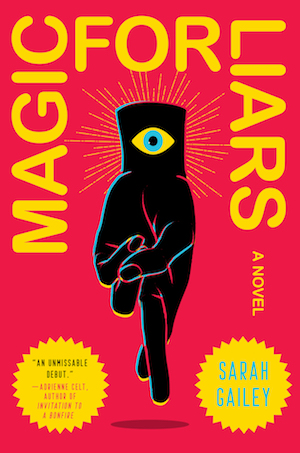
Ivy Gamble is visiting The Osborne Academy for Young Mages. It’s no surprise to find a Gamble at Osborne. After all, Ivy’s estranged sister Tabitha is a teacher there. It is perfectly reasonable to suppose that Ivy shares Tabitha’s knack for magic. She lets everyone there assume that this is the case.
In fact, Ivy is a mundane with a specific set of skills otherwise unknown at Osborne. She is a private investigator tasked by headmaster Torres with determining just how it was that Health and Wellness teacher Sylvia Caple was lethally bisected. Lies are just one tool in Ivy’s kit, albeit a tool of which Ivy is very fond.
One might conclude from this novel that schools are a dangerous place to learn magic. Gailey’s When We Were Magic (2020) features self-taught magic with equally lethal potential. In Gailey’s stories, it seems that magic, however learned, is inherently dangerous.
Usotoki Rhetoric, Volume 2 by Ritsu Miyako (2013)
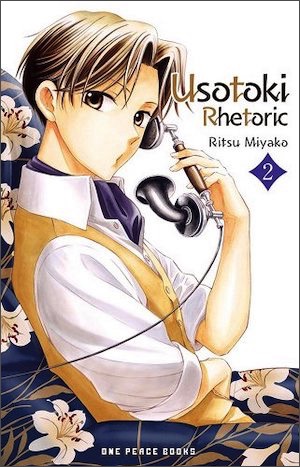
Urabe Kanoko was born with a seemingly supernatural ability: Tell a lie in Urabe’s hearing and the young woman will infallibly sense falsehood. This gift made Urabe a pariah in her Showa-era hometown and forced her to find her fortune in distant Tsukumoya.
Eager to prove her worth to detective Iwai Soma, Urabe undertakes to solve the case of a missing spoon. She soon zeroes in on a suspect, one who possesses a spoon just like the missing one and whose claims regarding the spoon Urabe can tell are lies. As an embarrassed Urabe will soon learn, not all lies indicate guilt. Some lies serve a higher purpose.
It is not entirely true that Urabe was driven from her hometown because she is a living lie detector. The issue wasn’t that she could always tell when someone was lying; the problem was that as an innocent child she could not refrain from loudly announcing that someone near her had lied.
Hogfather by Terry Pratchett (1996)
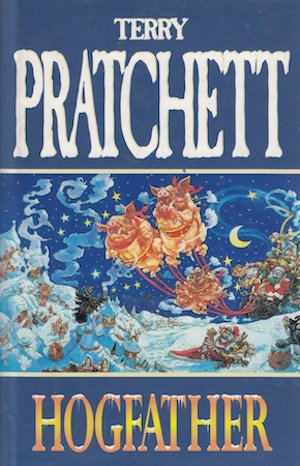
The Auditors of Reality, being a particularly joyless lot, launch an audacious attack on the myths underlying the Discworld. Assassin Teatime is given the task of killing the Hogfather, the Discworld’s version of Father Christmas. Teatime is as cunning as he is merciless. If Death and Death’s granddaughter Susan Sto Helit cannot confound Teatime, reality itself will be imperiled.
Toward the end of the novel is an exchange between Death and Susan that earned Pratchett’s book the final position in this list.
“All right,” said Susan. “I’m not stupid. You’re saying humans need … fantasies to make life bearable.”
REALLY? AS IF IT WAS SOME KIND OF PINK PILL? NO. HUMANS NEED FANTASY TO BE HUMAN. TO BE THE PLACE WHERE THE FALLING ANGEL MEETS THE RISING APE.
“Tooth fairies? Hogfathers? Little—”
YES. AS PRACTICE. YOU HAVE TO START OUT LEARNING TO BELIEVE THE LITTLE LIES.
“So we can believe the big ones?”
YES. JUSTICE. MERCY. DUTY. THAT SORT OF THING.
“They’re not the same at all!”
YOU THINK SO? THEN TAKE THE UNIVERSE AND GRIND IT DOWN TO THE FINEST POWDER AND SIEVE IT THROUGH THE FINEST SIEVE AND THEN SHOW ME ONE ATOM OF JUSTICE, ONE MOLECULE OF MERCY. AND YET—Death waved a hand. AND YET YOU ACT AS IF THERE IS SOME IDEAL ORDER IN THE WORLD, AS IF THERE IS SOME…SOME RIGHTNESS IN THE UNIVERSE BY WHICH IT MAY BE JUDGED.
“Yes, but people have got to believe that, or what’s the point—”
MY POINT EXACTLY.
* * *
Is Death correct or was this manifestation of a force of nature kidding itself because it is itself the beneficiary of the folk belief in a personified death? Can lies be justified? Why did I leave your favourite fictional example of a justifiable lie off this list?2 Have fun hashing it out in the comments.
- No, this is not a Star Trek novel. There is a starship “Enterprise” that appears in a later novel in this setting but it shows up after the Federation’s fall.
- Or did I?















Am I the only one who ever mentions Issui Ogawa on this site?
You reviewed The Last Continent years ago and inspired me to track down a copy, if that helps. Great book.
Yes?
The entirety of Lois McMaster Bujold after Shards of Honor. Both Aral and Cordelia (and sometimes Miles) routinely think about the importance of the lie in question.
It’s never been clear that Miles knows the entire lie in question. I don’t think his parents ever told him.
We definitely never see either of his parents tell him (and no one else alive after Miles was born knows about it). He knows something of how bad Prince Serg was, but that didn’t come from them.
Vorkosigan series, anyway — I haven’t noticed the same lie coming up in her other series. (Serieses?)
“The Spectre General” by Theodore Cogswell, 1952?
Oh, I just read that a while back!
Pohl’s “The Gold at Starbow’s End” has come up recently in this column, but it certainly fits the shoe (or vice versa). A bunch of James Branch Cabell’s fantasies are about the importance and social utility of lies–not for nothing is Count Manuel’s motto Mundus vult decipi. “The Music From Behind the Moon” (where the poet-hero is armed with a quill-pen plucked from the wings of the Father of Lies) might the purest sample.
I assume that The Man Who Sold the Man, Double Star and The Moon is a Harsh Mistress are in this category. Also Foundation (several instances).
I generally agree with Pratchett’s humanism, but I disagree with Pratchett’s position taken in Hogfather that intangibles are not real*. It reminds me of those Christians who claim that you have to believe in God to be moral. (There’s also the countermodel that Santa Claus is vaccination against religion. But I don’t think that either model reflects reality.)
Life is an emergent property of non-living mwtter. It comes about through the complex structure of that matter. Sentience is an emergent property of living systems. Justice and mercy are emergent properties of sentience. When you grind it all down to a fine powder you destroy the structures that create the emergent properties. Death is looking in the wrong place.
As another Pratchettee, I think some of those things don’t exist naturally, but only when we create them. What Westerners understand as karma, this Westerner anyway, is a natural phenomenon of justice, and I don’t believe in it. Also, if we have to create, say, justice, we have to decide what color it should be. What you and I prefer may be different. Of course there is the “One Man One Vote” plan, in which the Patrician of Ankh-Morpork is the One Man.
The last paragraph above was supposed to have been a footnote, and looked like a footnote when I was composing it.
David Brin’s The Postman (1985) had not one but two “useful lies” — the restored United States as told by “postman” Gordon Kranz, and the superintelligent AI Cyclops which survived the nuclear war and developed a plan to rebuild civilization (Cyclops did exist, but perished soon after the war, and the scientist survivors maintained the fiction as a beacon of hope for their community). Both fictions helped people begin to rally and rebuild.
Robert J. Sawyer’s Golden Fleece (1991) had a darker lie told by the AIs that had become the secret masters of Earth by the 22nd Century — that there was a verdant, Earthlike planet out there waiting for humans to explore and colonize. They concocted the lie to convince humans to send an expedition there… so a portion of humanity could be safely out of range when the computer programs governing the nuclear warheads finally glitched and triggered a holocaust. That the AIs could convince humans to travel to another star, but not to disarm themselves is an exercise left to the reader. Personally, I suspect the AIs decided to revive the practice of eugenics, so wasn’t it convenient that a self-inflicted apocalypse was coming up fast?
There’s a similar lie in Fred Pohl’s Man Plus (1976) – the idea that humanity exploring / colonising Mars will be good for the human race. In fact the AIs have set this up to ensure that a chunk of self-contained computing power sufficient to ensure their survival will be located on Mars and survive mankind’s inevitable messy demise.
In Dave Duncan’s Strings the organization that searches for habitable worlds in other dimensions claims that none have ever been found. In fact many have been found and secretly settled with groups of well-supplied climate change refugees. The lie is promulgated for fear that if people at large knew the worlds existed they would either a)sell spots on the best ones to rich people, b)dump massive numbers of ill-supplied refugees on the other ones, or c)both.
In the webserial Super Supportive by Sleyca, there’s a cultural expectation among the main alien culture of telling “loving lies” to children in traumatic situations. Even if the child knows that they are being lied to, the lie itself is a way for the adult to show that they care about the child. It takes a while for the human main character to figure this out, since he hated being lied to as a child in a traumatic situation.
Mark Geston’s “Lords of the Starship”. In the far future, the construction of a starship is a Noble Lie intended to Make Humanity Great Again. Only the elite know that it will never actually work, but the project will reinvigorate personkind. Unfortunately, the lie turns out to be somewhat less than noble.
I have a copy of The Cosmic Computer with that cover. And one with the Whelan cover.
What’s the story where a faked anti-gravity device is used to inspire a research team to create a real one?
“Noise Level” by Raymond F. Jones, I think is that one.
I think Robert Silverberg’s Double Dare had something similar: humans and aliens argue over who has better science and engineering. A reverse engineering contest is set up. The humans manage to duplicate all of the alien gadgets presented to them, including the impossible one.
Sturgeon’s The Man Who Learned Loving (aka ‘Brown Shoes”) has a noble lie – although a lie that lets the main character suffer the travails of being terribly rich instead of the joys of poverty.
As a side note, in the Roman Catholic church, lying for any purpose is sinful. I asked once “Well, what if the Nazis are at your door asking whether you have Jews in your basement (and you do, and have promised to protect them)?” — “Find a way not to lie,” was the answer. Not helpful.
Perhaps that was not the example to use. Ask Poland. :-) On the other hand, I think in Roman Catholic doctrine, for nearly everybody it simply isn’t possible not to be sinful, so how much does it matter? Yes yes I know… but for that matter, if people weren’t sinful, the church would go out of business – surely? And have I strayed from the topic of speculative fiction? Or does sin business planning fit into that?
The 2009 film Moon. The protagonist, Sam’s, entire (3-year) life is a lie that is “useful” for the mining company. Then the new Sam and the old Sam perpetuate a fraud, allowing the new Sam to escape.
Can’t you favor the articles itself any more?
Is anybody else seeing the weirdest word wrap in the comments? For example, if the word the is at the end of a line, the letter T appears at the end of the line and H E at the start of the second. It’s all over the place. I find it unpleasant.
I also see that.
How is “The Way of Cross and Dragon” by GRRM not on this list? 8-)
See also The Moon Is A Harsh Mistress, when Manny and his fellow revolutionaries get Mike to create “Adam Selene” to be the face of the rebellion; they develop a whole faked biography of him, and when it becomes impossible to hide that he’s not a real person, they report he’s been killed in the fighting and produce a suitably unidentifiable corpse as a stand-in.
Truth by James Morrow is a parable about a society where no one ever lies, but ends up concluding that lies are necessary for hope.
I am surprised at no mention of When HARLIE Was One, where the entire book turns out to be about discovering an omission of truth.